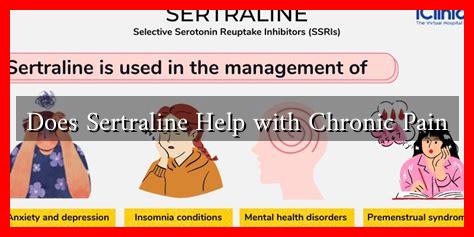-
Table of Contents
Does Sertraline Help with Chronic Pain?
Chronic pain is a complex and often debilitating condition that affects millions of people worldwide. While traditional pain management strategies typically focus on physical therapies and medications, there is growing interest in the role of antidepressants, particularly selective serotonin reuptake inhibitors (SSRIs) like sertraline, in alleviating chronic pain. This article explores the relationship between sertraline and chronic pain, examining its efficacy, mechanisms, and potential benefits.
Understanding Chronic Pain
Chronic pain is defined as pain that persists for longer than three months, often outlasting the typical healing process. It can arise from various conditions, including:
- Arthritis
- Fibromyalgia
- Neuropathic pain
- Chronic back pain
- Headaches and migraines
This type of pain can significantly impact an individual’s quality of life, leading to emotional distress, anxiety, and depression. As a result, effective management of chronic pain often requires a multifaceted approach that addresses both physical and psychological components.
What is Sertraline?
Sertraline is an SSRI commonly prescribed to treat depression, anxiety disorders, obsessive-compulsive disorder (OCD), and post-traumatic stress disorder (PTSD). By increasing the levels of serotonin in the brain, sertraline helps improve mood and emotional well-being. However, its potential role in pain management has garnered attention in recent years.
Sertraline and Chronic Pain: The Evidence
Research into the effectiveness of sertraline for chronic pain relief is still evolving, but several studies suggest that it may offer benefits for certain types of pain. Here are some key findings:
- Fibromyalgia: A study published in the journal Pain found that sertraline significantly reduced pain and improved overall function in patients with fibromyalgia. Participants reported decreased pain intensity and improved sleep quality.
- Chronic Back Pain: Research in the Journal of Pain Research indicated that patients with chronic back pain who were treated with sertraline experienced a reduction in pain levels and improved emotional well-being.
- Neuropathic Pain: A meta-analysis published in Neurology suggested that SSRIs, including sertraline, may be effective in managing neuropathic pain, particularly when combined with other pain management strategies.
Mechanisms of Action
The exact mechanisms by which sertraline alleviates chronic pain are not fully understood, but several theories exist:
- Serotonin Modulation: Sertraline increases serotonin levels, which can influence pain perception and emotional responses to pain.
- Anti-inflammatory Effects: Some studies suggest that SSRIs may have anti-inflammatory properties, potentially reducing pain associated with inflammatory conditions.
- Improved Sleep: By addressing anxiety and depression, sertraline may improve sleep quality, which is crucial for pain management.
Case Studies and Patient Experiences
Numerous anecdotal reports and case studies highlight the positive impact of sertraline on chronic pain management. For instance, a patient with fibromyalgia reported significant pain relief and improved daily functioning after starting sertraline, allowing her to engage in activities she had previously avoided due to pain.
Another case involved a patient with chronic back pain who experienced a notable reduction in pain levels and improved mood after a few weeks of sertraline treatment. These individual experiences align with clinical findings, suggesting that sertraline may be a valuable addition to chronic pain management strategies.
Conclusion
While more research is needed to fully understand the role of sertraline in chronic pain management, current evidence suggests that it may provide significant benefits for certain patients, particularly those with fibromyalgia, chronic back pain, and neuropathic pain. By addressing both the emotional and physical aspects of chronic pain, sertraline offers a promising avenue for improving quality of life.
As with any medication, it is essential for individuals to consult with their healthcare providers to determine the most appropriate treatment plan for their specific needs. For more information on chronic pain management and treatment options, consider visiting the American Pain Foundation.

